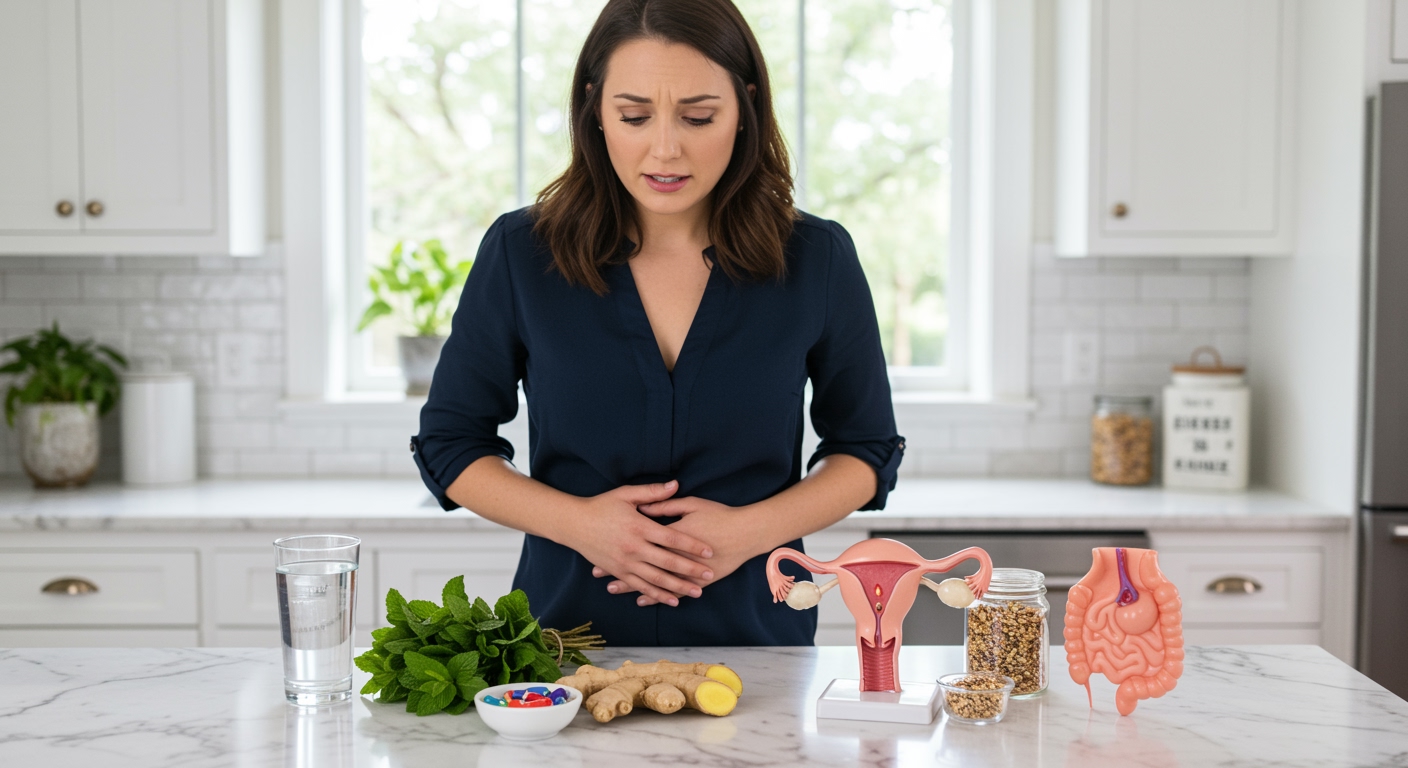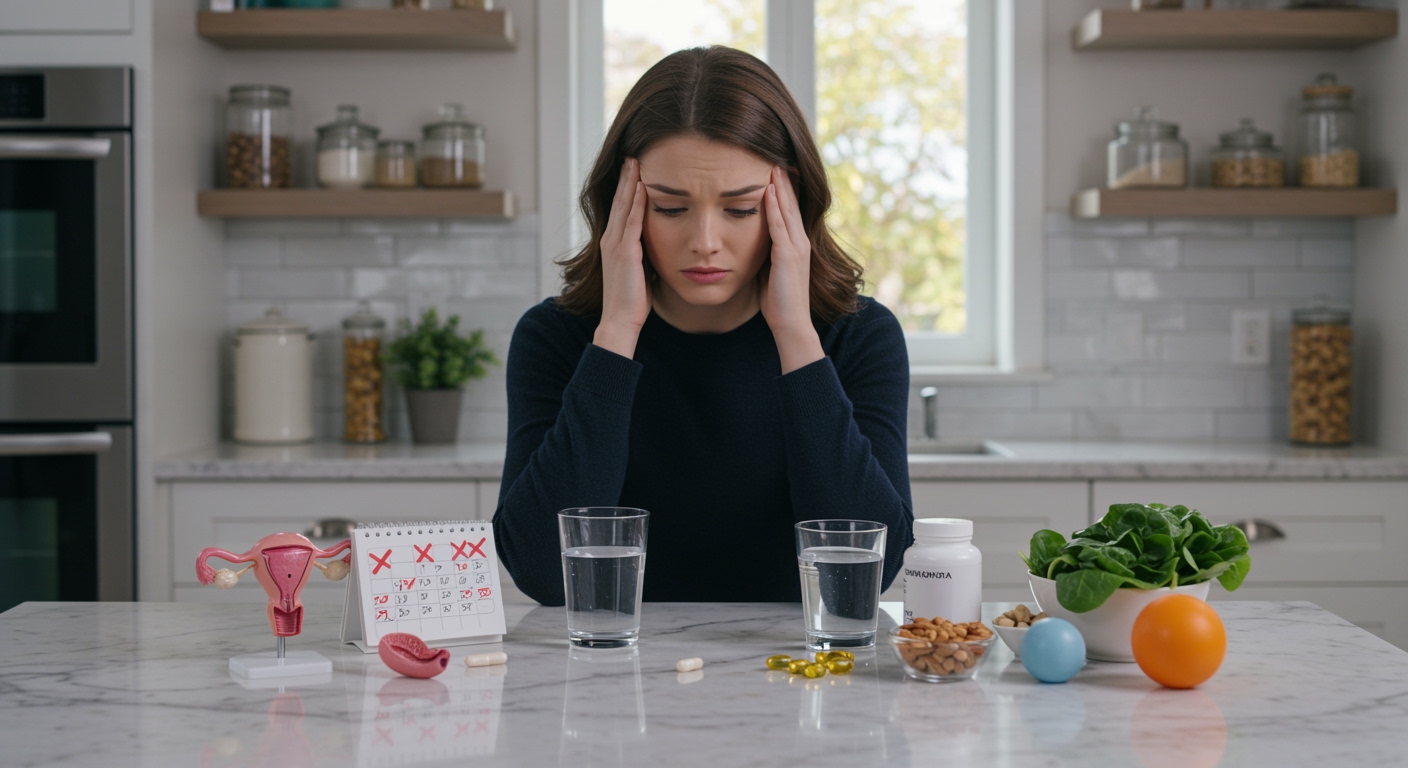✪ Key Takeaway: PCOS directly causes digestive issues and bloating through insulin resistance and hormonal imbalances.
Introduction
You feel like your stomach is constantly bloated, and you wonder if your PCOS diagnosis explains these uncomfortable digestive symptoms.
Many women with PCOS experience digestive problems but never connect them to their hormonal condition because most doctors focus only on reproductive symptoms.
Hi, I’m Abdur, your nutrition coach, and today I’m going to explain exactly how PCOS causes digestive issues and what you can do about it.
How Does PCOS Affect Your Digestive System?
PCOS creates a perfect storm of hormonal chaos that directly impacts your digestive system in multiple ways.
The condition causes insulin resistance in up to 80% of women, which slows down digestion and increases inflammation throughout your body.
High insulin levels also promote the growth of harmful bacteria in your gut while suppressing beneficial microbes that aid digestion.
Elevated androgen hormones like testosterone further disrupt your gut microbiome balance, creating an environment where bloating and digestive discomfort thrive.
The chronic inflammation associated with PCOS damages your intestinal lining, leading to increased intestinal permeability or what researchers call leaky gut syndrome.
This damaged gut barrier allows toxins and undigested food particles to enter your bloodstream, triggering more inflammation and digestive symptoms.
✪ Fact: Women with PCOS are 3 times more likely to develop irritable bowel syndrome compared to women without the condition.
Why Does PCOS Cause Bloating Specifically?
Bloating happens when your digestive system struggles to process food efficiently, and PCOS creates several mechanisms that make this worse.
The insulin resistance common in PCOS slows gastric emptying, meaning food sits in your stomach longer than normal.
This delayed digestion allows bacteria to ferment carbohydrates in your small intestine, producing excess gas that causes that uncomfortable bloated feeling.
High cortisol levels from chronic stress associated with PCOS also reduce digestive enzyme production, making it harder to break down proteins and fats properly.
The hormonal fluctuations in PCOS affect your gut motility, causing food to move too slowly through your intestines and creating backup that manifests as bloating.
Water retention from elevated estrogen levels can also contribute to that puffy, bloated sensation that many women mistake for digestive issues alone.
✪ Pro Tip: Track your bloating patterns with your menstrual cycle to identify hormonal triggers and plan accordingly.
What Other Digestive Symptoms Can PCOS Cause?
Beyond bloating, PCOS can trigger a wide range of digestive symptoms that significantly impact your quality of life.
Many women experience constipation due to slower gut motility caused by hormonal imbalances and insulin resistance.
Others develop alternating patterns of constipation and diarrhea, similar to irritable bowel syndrome symptoms.
Acid reflux and heartburn become more common because PCOS affects the muscles that control your lower esophageal sphincter.
Food intolerances may develop or worsen, particularly to dairy and gluten, due to increased intestinal inflammation and compromised gut barrier function.
Some women notice increased sugar cravings and blood sugar crashes after meals, which are directly related to insulin resistance affecting digestion.
Nausea and stomach pain can occur, especially after eating carbohydrate-rich meals that challenge an already compromised digestive system.
✪ Note: These digestive symptoms often improve significantly when PCOS is properly managed through diet and lifestyle changes.
How Can You Manage PCOS-Related Digestive Issues?
Managing digestive symptoms requires addressing the root cause of PCOS rather than just treating individual symptoms.
Focus on improving insulin sensitivity through a low-glycemic diet that emphasizes whole foods and limits processed carbohydrates.
Include plenty of fiber-rich vegetables and fruits to feed beneficial gut bacteria and promote healthy digestion.
Consider adding probiotic foods like yogurt, kefir, and fermented vegetables to help restore healthy gut microbiome balance.
Regular physical activity improves insulin sensitivity and promotes healthy gut motility, reducing both bloating and constipation.
Stress management through meditation, yoga, or other relaxation techniques can help reduce cortisol levels that worsen digestive symptoms.
Stay hydrated and consider digestive enzymes with meals if you continue experiencing symptoms despite dietary changes.
✪ Pro Tip: Eating smaller, more frequent meals can reduce digestive stress and help manage both blood sugar and bloating.
The Bottom Line
PCOS absolutely can and does cause digestive issues including bloating, constipation, and other uncomfortable symptoms through multiple interconnected mechanisms.
Your digestive health is a mirror reflecting your hormonal balance – fix one and you improve the other.
I would love to hear about your experience with PCOS and digestive symptoms, so please share your questions or thoughts in the comments below.
References
At NutritionCrown, we use quality and credible sources to ensure our content is accurate and trustworthy. Below are the sources referenced in creating this article:
- Cleveland Clinic: Polycystic Ovary Syndrome (PCOS)
- PMC: PCOS and Digestive Health Research
- PCOS Nutrition: PCOS and Bloating: Causes and Treatment
- Allara Health: PCOS Treatment for Bloating





